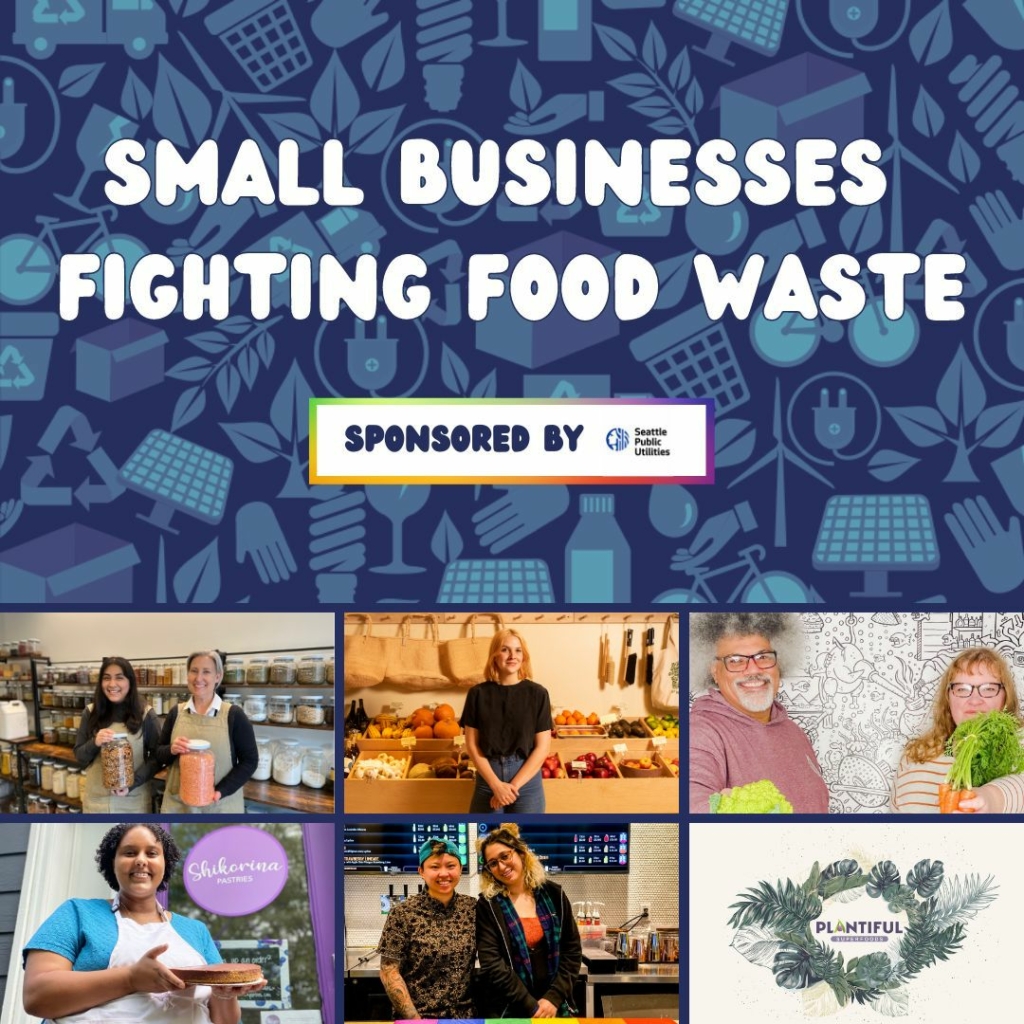
Welcome to Food Waste Prevention Week! Food waste is a huge problem, with billions of pounds of food going to waste every year. But the good news is that we can all make a difference when we #SpendLikeItMatters at small businesses fighting food waste.
Additionally, there are many ways intentional spenders can prevent food waste at home. Here are some tips to consider:
- Donate excess food: If you have excess food that you know you won’t use, consider donating it to a local food bank or shelter. This can help feed those in need and reduce food waste.
- Compost food scraps: If you have access to a garden or yard, composting food scraps is a great way to create nutrient-rich soil.
- Use all parts of the produce: When you’re preparing fruits and vegetables, try to use as much of them as possible. For example, you could use broccoli stems in stir-fries or soups, or use citrus peels to make homemade cleaners.
- Freeze food before it goes bad: If you know you won’t be able to use certain ingredients before they go bad, consider freezing them for later use. For example, frozen overripe bananas are the perfect ingredient for a smoothie. You can also freeze excess herbs in ice cube trays for future use!
By making small changes like these in our daily habits, and by choosing to support local businesses that prioritize sustainability, we can collectively make a big impact on the environment and create a ripple effect of positive change.
Intentionalist and Seattle Public Utilities are thrilled to shine a spotlight on a collection of small businesses in Seattle that are dedicated to reducing food waste and other sustainable measures to keep our planet and people healthy.
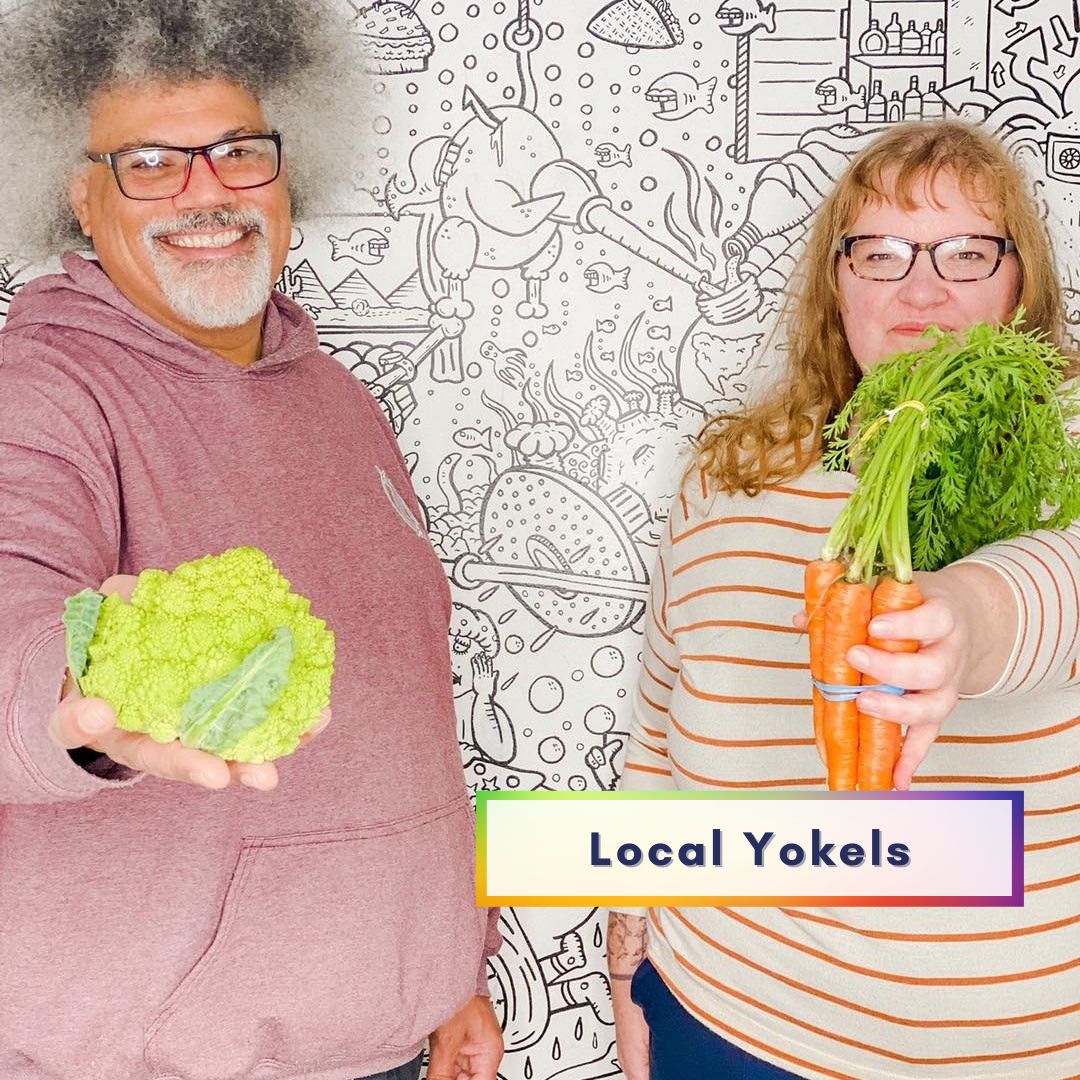
“We started Local Yokels to do our part in creating a fully sustainable micro economy in local food. We accomplish this by minimizing food waste by ordering exactly what we need from our producers and donating any extras to Food Not Bombs. We eliminate waste and the use of plastic by using compostable and recyclable packaging where ever possible, using reusable tubs to haul produce, and delivering with reusable bags and icepacks that we collect sanitize and reuse. We also support our producers taking glass bottle returns by collecting them from our customers and returning them to our producers.” -Amber Whittenberg, Co-owner of Local Yokels
Local Yokels (Maple Leaf) – Local Yokels was started in 2017 on the idea that a fully sustainable and ethical micro-economy in local food could exist! Local Yokels delivers farmers’ markets and local shop favorites to your door. They use compostable packaging and reusable bags for delivery and are working towards creating closed-loop systems between producers and customers.
Having accessible, affordable, clean, and natural foods is very important to owners Amber and Damon, and they are working toward zero waste.
Fun Fact: Local Yokels’ carbon footprint is 95% lower than a traditional grocery store!
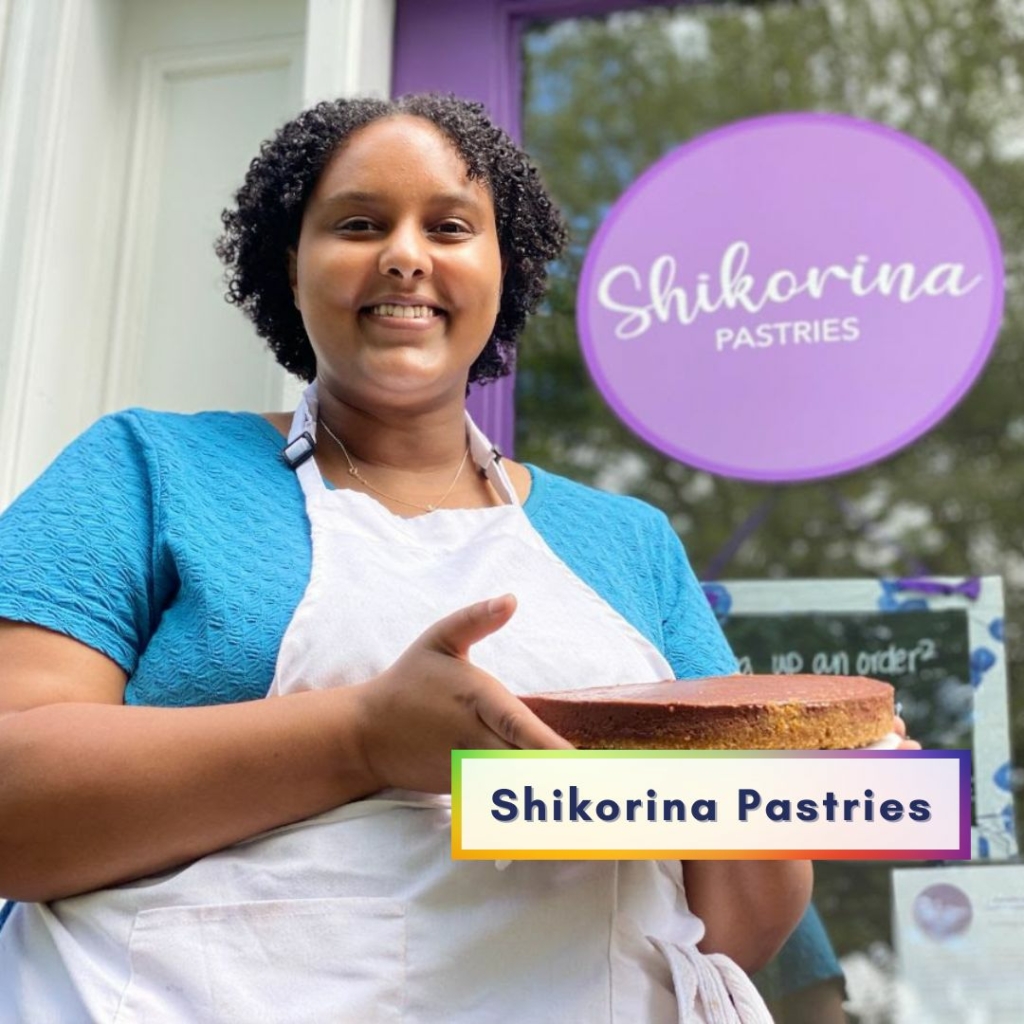
“Since our inception, Shikorina has strived to be zero waste, always making the extra effort to protect our environment. If you get it from us, it can either be reused, recycled, or composted. During an average week, our bakery doesn’t make enough garbage to fill a 13-gallon waste bin. We also prevent food waste by offering less-than-perfect pastries at a largely discounted cost. It’s so important that consumers push for waste reduction. The more that individuals and small businesses make eco-friendly changes, the more accessible and prevalent sustainability becomes. We’ve normalized the waste-free standard in our bakery and I hope that more businesses do the same!” – Hana Yohannes, owner of Shikorina Pastries
Shikorina Pastries (Central District) – Hana Yohannes has always loved pastry making and wanted to use her passion as a way to uplift and support her community. In 2020, Hana opened her bakery Shikorina Pastries to bring people together and spread a little happiness through cookies, cakes, tarts, and more!
All of the ingredients are ethically sourced and are fair-trade, organic, and/or local. For Hana, it’s a priority that her business does good for the community and she’s put a lot of effort into making the business a sustainable, community-oriented, and inclusive space.
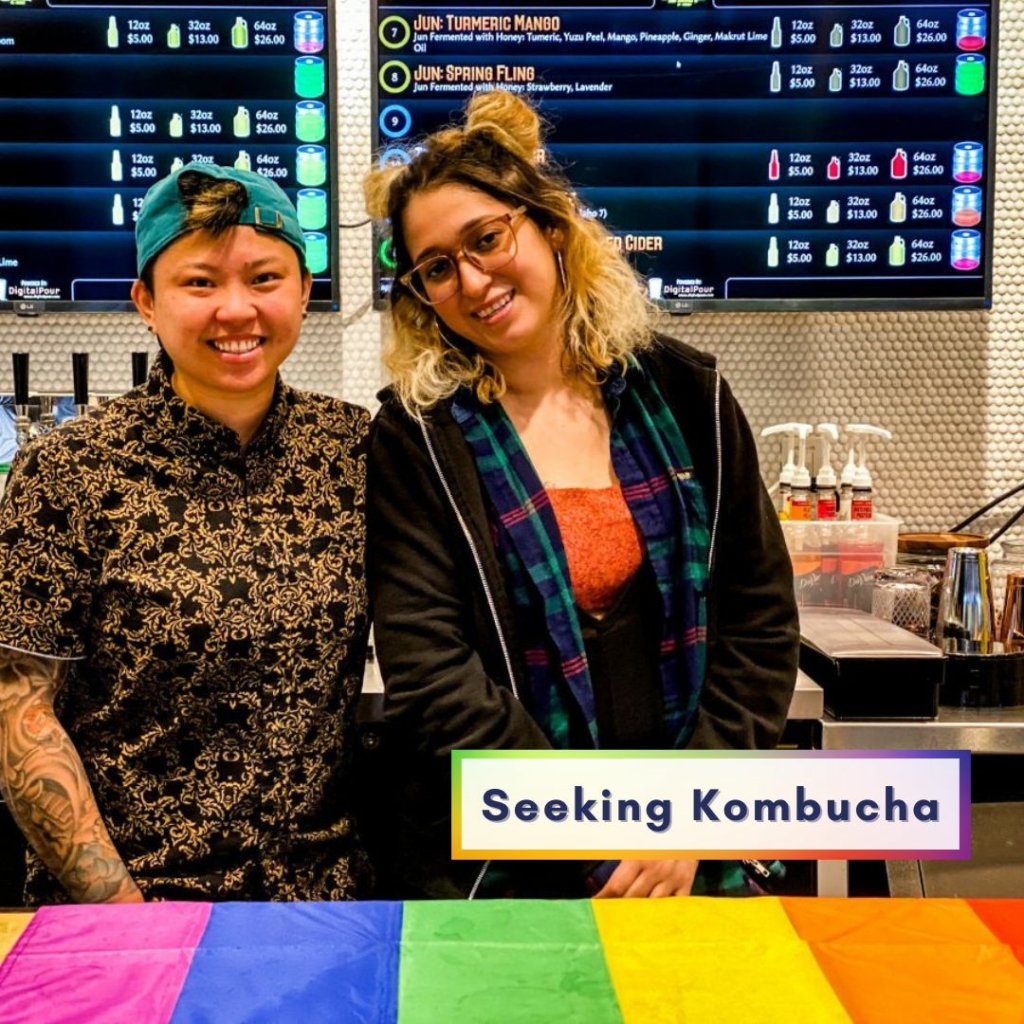
“We focus strongly on sustainability because we need to take care of the earth. We use local Washington farmer ingredients and encourage people to do bottle swaps. We also use fruits to create our simple syrups. At that stage, it’s the second life of the fruit. We’re aiming to become zero waste by turning that leftover fruit into fruit rolls.” – Jeanette Macias and Lyz Bartolome, Owners of Seeking Kombucha
Seeking Kombucha (South Lake Union) – In 2021, after years of success at local farmer’s markets, Jeanette Macias and Lyz Bartolome opened the brick-and-mortar for their small-batch kombucha business, Seeking Kombucha. The business was inspired by Jeanette’s stomach pain relief after drinking kombucha.
When Jeanette and Lyz started brewing their own kombucha everyone wanted a taste, so they started their business in hopes that others would benefit from it. Their kombucha is always 100% raw, organic, and vegan, and is gluten-free when possible. Their flavors, ranging from blue apple to ruby lychee, never disappoint.
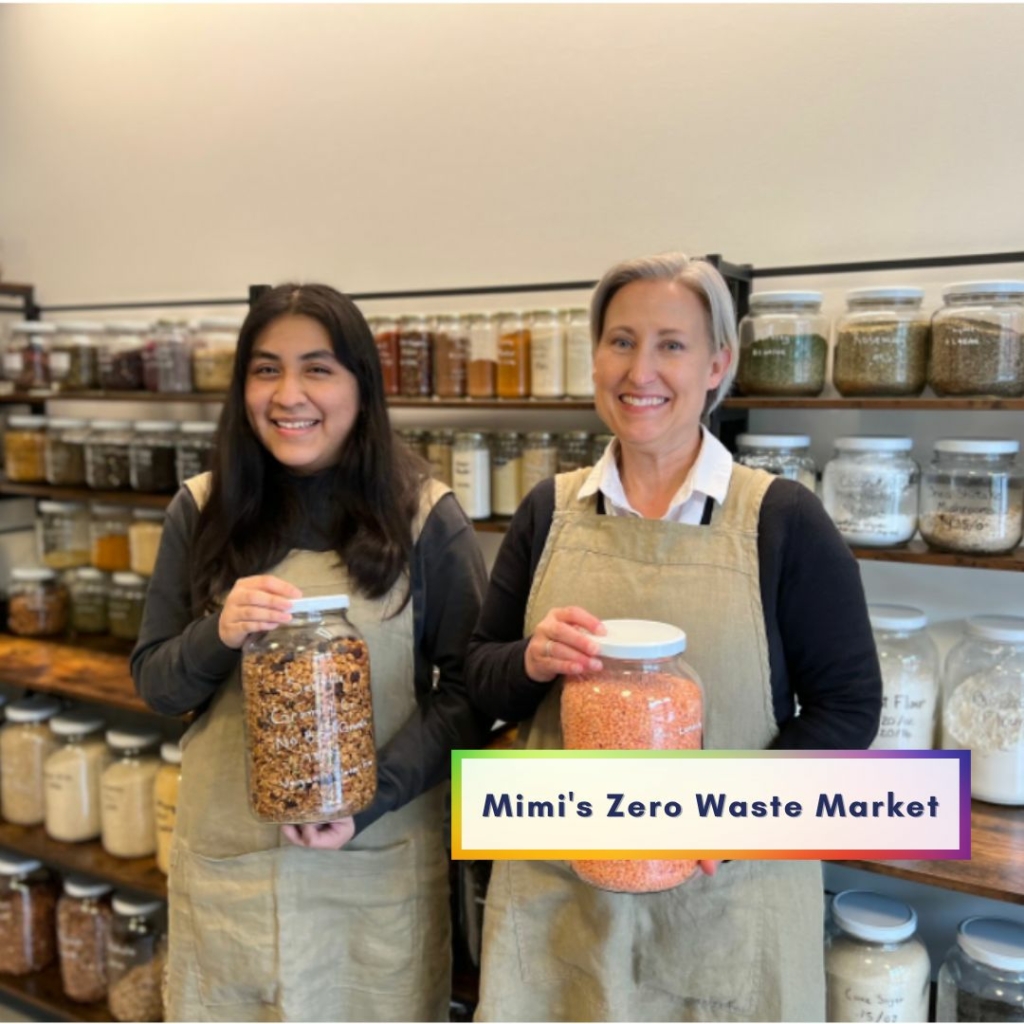
“Buying organic pantry staples and dry goods in bulk by the ounce, not only saves packaging waste, it allows you to buy only the amount you need. Especially if you are trying a new ingredient like farro or oat milk powder, or, if you are preparing a recipe you don’t make often, you can purchase small amounts. For staples like flour, rice, and oats we suggest purchasing a 2-4 week supply so that your dry goods are always relatively ‘fresh’ and don’t linger in the cupboard for too long – causing them to go stale and be wasted.” – Heather Williams, Owner & Co-Founder of Mimi’s
Mimi’s Zero Waste Market (Crown Hill) – In 2021, Heather Williams and Berenice Cuautle Arellano founded Mimi’s Zero Waste Market to offer a convenient way for eco-conscious Seattleites to shop. Alongside bulk laundry detergents and skin care products, you can stock up on pantry staples, including spices, flours, grains, and teas — all in whatever quantity you need using your own clean, reusable containers. Heather and Berenice source their products from ethical and sustainable businesses and feature many local and BIPOC-owned suppliers.
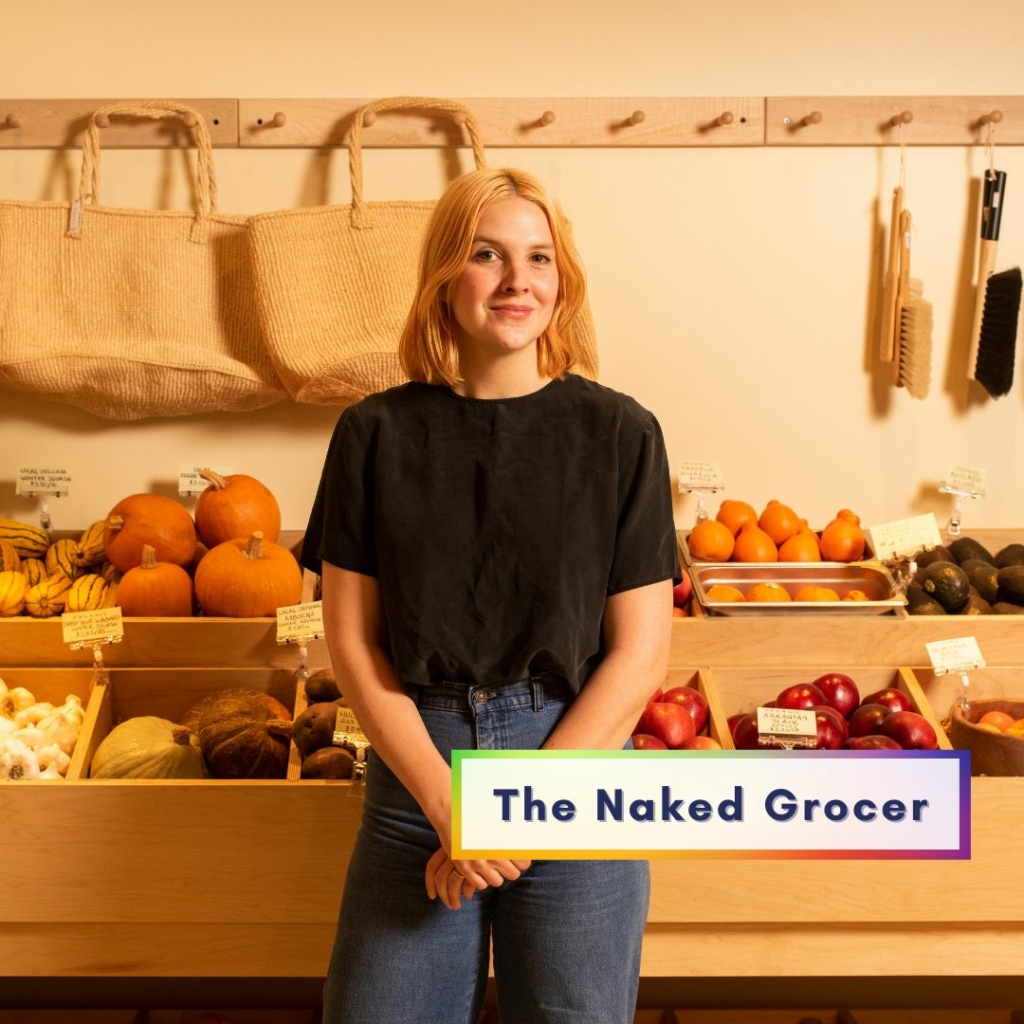
“The Naked Grocer has been committed from the beginning to keep food out of the trash, especially in light of the fact 40% of food waste in the US comes from grocery stores. We utilize most, if not all, of our surplus and “less-than-perfect” foods in our prepared foods. Since we are so small we can change up what we make in the kitchen every week, customizing our menu to fit what we have on hand and need to use up. it’s been a fun opportunity to get creative with ingredients and give a second life to sad produce!” – Jayne Truesdell, owner of The Naked Grocer
The Naked Grocer (Capitol Hill) – Jayne Truesdell opened The Naked Grocer, a “waste-less” grocery store, in Seattle’s Capitol Hill neighborhood in 2022. Her store prioritizes sustainability by supporting environmentally responsible producers, avoiding single-use plastic packaging, and sourcing food as locally as possible.
You’ll find an inventory of fresh produce, pantry staples, dairy products, eggs, tofu, bakery goods, and more at The Naked Grocer. Don’t forget to BYOC: Bring Your Own (refillable) Containers!
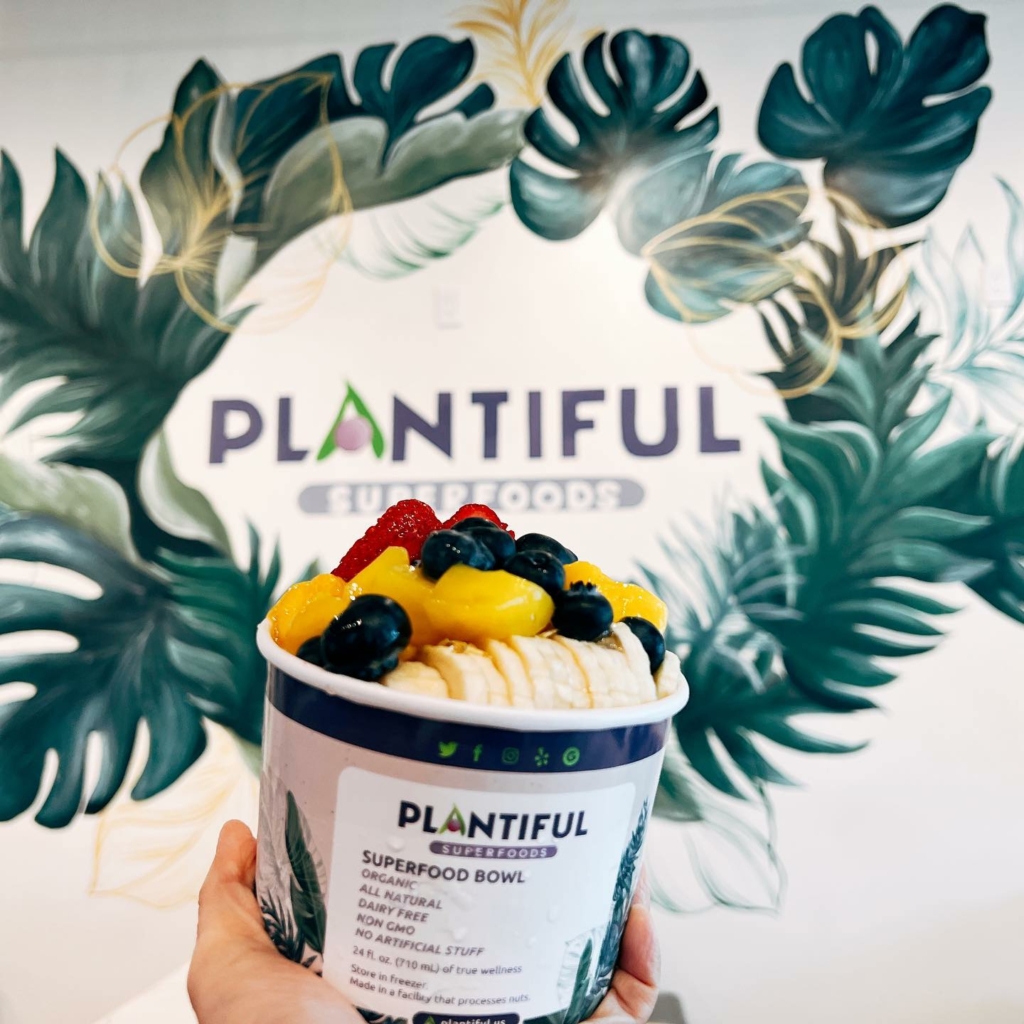
“In addition to focusing on healthy plant-based options, our concept is definitely committed to food waste reduction. Our mission is to make it easy to eat delicious, wholesome, and sustainable foods, and decreasing food waste is also good for the environment. When it comes to choosing more sustainable food options, it’s tough to strive for perfection, but small changes really do make an enormous difference over time. We have developed a working procedure that is well executed to minimize mistakes and stock waste. All of our hot food items are cooked to order. We cook our foods by air fryer, not using cooking oil and that helps save energy and oil waste. We train our employees on proper food preparation techniques, and avoid over-preparing to ensure perfectly good food doesn’t end up as food waste. We use the first in first out method to rotate our inventory, bringing older items to the front of the storage areas ensuring they get used before they spoil and labeling all of the items with use-by dates. Our fresh produce is delivered once or two times a week on request. That helps with overbuying and preventing food spoilage. We use ingredients that can be cross-used in multiple dishes, such as items that are stocked regularly and/or in large quantities. This will help take advantage of the cost savings of buying in bulk, while ensuring that none of the ingredients spoil to become food waste because they don’t get used often enough. This isn’t all about reducing operating costs, wasting less food leads to less garbage, and is also good for the climate. Hence, we achieve positive returns from reducing food loss and waste. ” – Son & Jessie Nguyen, Owners of Plantiful Superfoods
Plantiful Superfoods (Kirkland, WA) – Son and Jessie Nguyen believe that all good food starts with sourcing the best ingredients. They opened Plantiful Superfoods in Seattle’s South Lake Union neighborhood to create wholesome, delicious, and sustainable food option that feeds the body while also nourishing the mind.
Plantiful knows that just because plant-based products have become more available in recent years, great-tasting products still take time to procure. Because of this, they are careful in selecting items from reputable vendors and farms to assure freshness, vibrant colors, and stunning taste. Bonus: Check out their other location in Seattle’s South Lake Union Neighborhood!